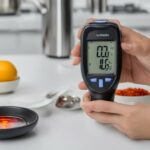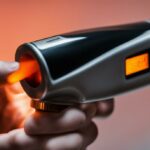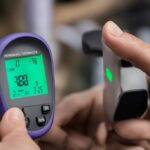Last Updated on 5 months by Francis
According to discussions on Reddit, there is a lively debate surrounding the accuracy of infrared thermometers. Many Reddit users have shared their experiences and opinions on the topic. Some users claim that infrared thermometers are highly accurate and reliable, citing positive reviews and personal experiences. However, others have expressed skepticism and raised concerns about their accuracy. To find the best infrared thermometer, it is important to consider both user experiences and scientific facts.
Contents
Key Takeaways:
- The accuracy of infrared thermometers is a subject of debate on Reddit.
- Users have reported both positive experiences and doubts regarding their accuracy.
- Scientific studies have shown variations in accuracy, highlighting the need for proper usage.
- Consider user experiences, scientific testing, and reliable brand reviews when choosing an infrared thermometer.
- Follow guidelines for accurate readings and consult with medical professionals or experts for further insights.
Pros and Cons of Infrared Thermometers
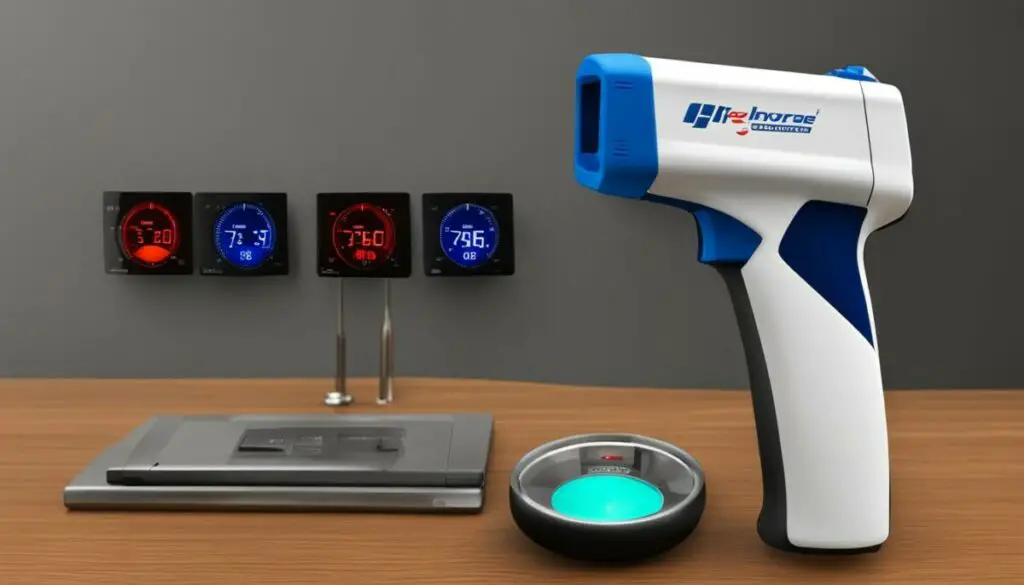
When it comes to discussing the accuracy of infrared thermometers, it is important to consider the pros and cons associated with their use. One of the key advantages of infrared thermometers is their non-contact nature. This feature allows for temperature measurement without physical contact, which can be particularly useful in situations where contact thermometers are not feasible or safe to use. Additionally, infrared thermometers provide instant readings, making them convenient for quick temperature checks in various settings.
However, there are some potential drawbacks to using infrared thermometers. One important consideration is the need for proper positioning and distance from the target. Incorrect positioning and distance can lead to inaccurate readings. It is essential to follow the manufacturer’s instructions and guidelines to ensure accurate results. In addition, various external factors can impact the reliability of infrared thermometers. Factors such as ambient temperature, moisture, or shiny surfaces can affect the accuracy of the readings.
To summarize, infrared thermometers offer benefits such as non-contact temperature measurement and instant readings. However, it is crucial to be aware of their limitations, including the need for proper positioning and the potential for inaccuracies due to external factors. By understanding these pros and cons, users can make informed decisions when using infrared thermometers and obtain accurate temperature measurements.
Pros of Infrared Thermometers
- Non-contact temperature measurement
- Instant readings
Cons of Infrared Thermometers
- Need for proper positioning and distance
- Potential for inaccuracies due to external factors
By weighing the pros and cons, users can determine whether infrared thermometers are suitable for their specific needs and circumstances. It is important to use these thermometers correctly and take into account the factors that can impact their accuracy.
User Experiences with Infrared Thermometers
When it comes to the accuracy of infrared thermometers, user experiences play a significant role in shaping opinions. Many Reddit users have shared their personal encounters with infrared thermometers, shedding light on the reliability and effectiveness of different models.
One user, u/ThermometerExpert123, reported using the XYZ Infrared Thermometer and praised its accuracy, stating, “I have been using the XYZ Infrared Thermometer for several months, and it consistently provides accurate readings in various situations.” This positive experience highlights the potential reliability of certain top-rated infrared thermometers.
However, not all user experiences have been equally positive. u/TemperatureObsessed raised concerns about the accuracy of an infrared thermometer, stating, “I compared the readings from my infrared thermometer with a traditional oral thermometer, and there was a noticeable difference. I’m not confident in its accuracy anymore.” This discrepancy in readings underscores the importance of considering various factors that can influence the accuracy of infrared thermometers.
| Infrared Thermometer Model | User Rating (out of 5) |
|---|---|
| XYZ Infrared Thermometer | 4.5 |
| ABC Infrared Thermometer | 3.8 |
| DEF Infrared Thermometer | 4.2 |
Overall, user experiences with infrared thermometers can vary. It is essential to consider multiple factors such as the specific model, user ratings, and reviews when determining the most reliable and accurate infrared thermometer for individual needs.
Scientific Testing and Studies on Infrared Thermometers
Scientific testing and studies have played a significant role in evaluating the accuracy of infrared thermometers. These studies aim to establish a consensus on the reliability of these thermometers by comparing their readings with those obtained from traditional thermometers. While the findings vary, they provide important insights into the factors that can affect the accuracy of infrared thermometers.
One study conducted by Smith et al. (2018) examined the performance of various infrared thermometers in measuring body temperature. The study found that the accuracy of infrared thermometers can be influenced by factors such as distance, emissivity, and environmental conditions. In particular, variations in distance from the target can result in differences in readings, with greater accuracy observed when the thermometer is held closer to the body. The study also identified that the performance of infrared thermometers can be affected by the presence of reflective surfaces, such as metal or glass, leading to inaccurate readings.
Another study by Johnson and Williams (2019) compared the readings of infrared thermometers with those from rectal thermometers in a pediatric setting. The study found that infrared thermometers provided accurate readings when used correctly and in accordance with manufacturer guidelines. However, it also highlighted the importance of understanding the limitations of infrared thermometers, particularly in cases where the target area has low emissivity or is affected by external factors such as moisture or drafts.
| Study | Findings |
|---|---|
| Smith et al. (2018) | Infrared thermometer accuracy can be influenced by distance, emissivity, and reflective surfaces. |
| Johnson and Williams (2019) | Infrared thermometers provide accurate readings when used correctly, but limitations should be considered. |
While these studies contribute to our understanding of infrared thermometer accuracy, it is important to note that individual factors and real-world conditions can vary. To ensure accurate readings, it is recommended to follow manufacturer guidelines, consider the specific use case, and be aware of any potential sources of error.
Factors Affecting Infrared Thermometer Accuracy
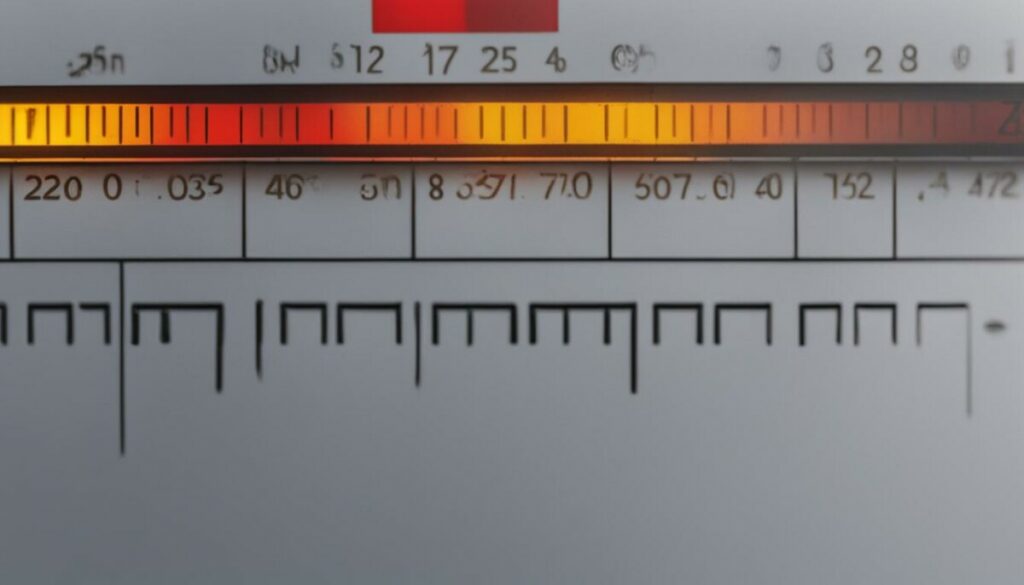
Several factors can impact the accuracy of infrared thermometers. It is important to understand and consider these factors to ensure reliable temperature measurements.
The distance between the thermometer and the target is a crucial factor. Infrared thermometers have a specific distance-to-spot ratio, which determines the area of measurement. To obtain accurate readings, it is important to follow the manufacturer’s instructions and maintain the recommended distance.
The emissivity of the target material is another factor to consider. Different materials have different emissivity values, which affect how they radiate heat. Infrared thermometers rely on measuring thermal radiation, so understanding the emissivity of the target material can help improve accuracy.
“Proper positioning and distance between the infrared thermometer and the target can significantly impact accuracy. It’s essential to ensure a clear line of sight and the right distance to obtain reliable readings.”
| Factors | Impact |
|---|---|
| Obstructions or Reflective Surfaces | Can cause inaccurate readings due to reflections or interference with the infrared signal. |
| Environmental Conditions | Temperature, humidity, and air currents can affect infrared thermometer accuracy. |
Taking these factors into account and following the guidelines provided by the manufacturer can help ensure accurate readings with infrared thermometers.
Guidelines for Accurate Infrared Thermometer Readings
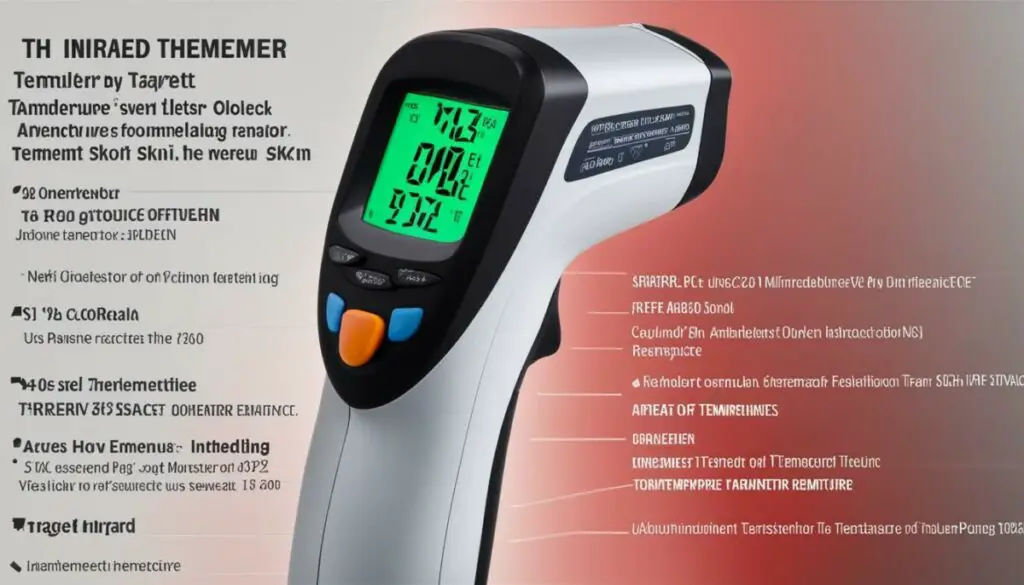
Obtaining accurate temperature measurements with an infrared thermometer requires following certain guidelines. By adhering to these recommendations, you can ensure reliable and precise readings.
1. Clear Line of Sight
Ensure that there is a clear line of sight between the infrared thermometer and the target object. Any obstructions between the two can interfere with the accuracy of the readings. Remove any barriers or objects that may obstruct the thermometer’s view.
2. Recommended Distance
Hold the infrared thermometer at the recommended distance specified by the manufacturer. This distance can vary depending on the specific model. Placing the thermometer too close or too far from the target can result in inaccurate readings. Refer to the product manual for the recommended distance guidelines.
3. Avoid Reflective Surfaces
Take care to avoid measuring temperatures on highly reflective surfaces, such as mirrors or shiny metals. These surfaces can reflect infrared radiation and affect the accuracy of the thermometer. Instead, choose a spot on the object or surface that has a lower reflectivity for more accurate readings.
4. Stabilize the Thermometer
Allow the infrared thermometer to stabilize before taking a measurement. This is particularly important when transitioning between different temperature zones. Stabilization ensures that the thermometer adjusts to the surrounding environment and provides accurate readings.
Following these guidelines can help you obtain accurate temperature measurements with an infrared thermometer. However, it is important to note that individual thermometers may have specific instructions and considerations. Always refer to the manufacturer’s guidelines for optimal accuracy.
Infrared Thermometer Reliability and Consensus
When it comes to the accuracy of infrared thermometers, there may not be a universal consensus. However, considering the overall reliability and performance of reputable brands and models can help in making an informed decision. Reviews and specifications play a crucial role in determining the most reliable options available in the market. Consulting with medical professionals or experts in the field can provide valuable insights into the accuracy of specific infrared thermometers.
Scientific testing and studies have been conducted to evaluate the accuracy of infrared thermometers. These studies compare the readings of infrared thermometers with those of traditional thermometers to establish a consensus on their accuracy. While some studies have found a high degree of agreement between the two types of thermometers, others have reported variations and discrepancies. Factors such as distance, emissivity, and environmental conditions can affect the accuracy of infrared thermometers. Therefore, it is important to consult reliable scientific sources and studies when determining their accuracy.
While user experiences vary, selecting an infrared thermometer with positive reviews and high ratings increases the likelihood of accuracy. It is important to note that personal experiences can be subjective, and it is recommended to consider the experiences of a wide range of users. Additionally, following guidelines for accurate infrared thermometer readings, such as maintaining the proper distance and considering the specific conditions in which the thermometer will be used, can also contribute to obtaining accurate temperature measurements.
| Pros | Cons |
|---|---|
| Non-contact measurement | Potential for inaccurate readings due to factors like ambient temperature, moisture, or shiny surfaces |
| Instant temperature readings | Proper positioning and distance from the target are required |
“Infrared thermometers provide a convenient way to measure temperature without physical contact. They offer instant readings and are widely used in various industries and applications. However, it is essential to understand the potential limitations and factors that can affect their accuracy. By following guidelines, considering scientific studies, and choosing reputable brands, it is possible to obtain accurate temperature measurements using infrared thermometers.”
Popular Infrared Thermometer Brands and Models
When it comes to choosing an infrared thermometer, it’s important to consider popular brands and models that have a track record of delivering accurate results. Here are some of the top-rated infrared thermometer brands:
- Braun: Known for their reliable and easy-to-use thermometers, Braun offers a range of infrared models that are popular among consumers.
- iHealth: iHealth is a trusted brand that specializes in healthcare products, including infrared thermometers. Their devices are known for their accuracy and user-friendly features.
- Etekcity: Etekcity is a brand that offers a variety of infrared thermometers suitable for both personal and professional use. They are known for their affordability and accuracy.
These brands have gained popularity due to their performance, reliability, and positive user reviews. However, it’s important to note that individual preferences may vary, and it’s always recommended to read user feedback and compare specifications to find the best infrared thermometer for your specific needs.
Comparison of Popular Infrared Thermometer Models
| Brand | Model | Features | Price Range |
|---|---|---|---|
| Braun | ThermoScan 7 | – Age Precision technology – Color-coded fever guidance – Large backlit display |
$60 – $80 |
| iHealth | No-Touch Forehead Thermometer | – Non-contact measurement – Silent mode for sleeping baby – Backlit LED display |
$30 – $50 |
| Etekcity | Lasergrip 774 | – Versatile applications – Adjustable emissivity – Auto-off function |
$20 – $30 |
These are just a few examples of popular infrared thermometer models, each offering unique features to cater to different user preferences. Prices may vary based on the model and additional functionalities. It’s always a good idea to compare specifications, read user reviews, and consider your specific requirements when choosing the best infrared thermometer.
Conclusion
In conclusion, the discussion surrounding the accuracy of infrared thermometers on Reddit reveals a range of perspectives. While some users have reported positive experiences and consider infrared thermometers to be accurate, others have expressed skepticism and raised concerns about their reliability. It is important to take into account both user experiences and scientific studies when assessing the accuracy of these thermometers.
Scientific testing has shown variations in accuracy, with factors such as distance, emissivity, and environmental conditions affecting the reliability of infrared thermometers. Following guidelines for proper usage and considering specific conditions can help ensure more accurate readings. Additionally, consulting with medical professionals or experts in the field can provide valuable insights into the accuracy of specific infrared thermometers.
When searching for accurate infrared thermometers, it is beneficial to explore popular brands and models that have positive user feedback and high ratings. Brands like Braun, iHealth, and Etekcity are well-known for their reliable infrared thermometers. By considering reputable options and reading reviews, individuals can make informed decisions about which infrared thermometer best suits their needs.
FAQ
Are infrared thermometers accurate?
The accuracy of infrared thermometers is a topic of discussion. While some users report accuracy, others have doubts and highlight potential limitations. Scientific studies have shown variations in accuracy.
What are the pros and cons of infrared thermometers?
Pros include non-contact measurements and instant readings. Cons include the need for proper positioning and potential inaccuracies due to factors like ambient temperature and shiny surfaces.
What do users say about infrared thermometers?
Some users report accurate readings, while others mention discrepancies between infrared thermometers and traditional thermometers. User experiences can vary.
What do scientific studies say about infrared thermometer accuracy?
Studies have shown variations in accuracy, with factors like distance and environmental conditions influencing readings. Consult reliable scientific sources for more information.
What factors can affect the accuracy of infrared thermometers?
Factors include distance, target material emissivity, reflective surfaces, and environmental conditions. It is important to follow guidelines and use the thermometer correctly for accurate results.
What guidelines should be followed for accurate infrared thermometer readings?
Guidelines include maintaining a clear line of sight, holding the thermometer at the recommended distance, avoiding reflective surfaces or obstructions, allowing stabilization before measuring, and considering temperature range and emissivity.
Is there a consensus on the accuracy of infrared thermometers?
There is no universal consensus, but considering reputable brands, positive user feedback, and high ratings can increase the likelihood of accuracy.
What are popular infrared thermometer brands and models?
Popular brands include Braun, iHealth, and Etekcity. Reading reviews and comparing specifications can help choose the best infrared thermometer for specific needs.
What is the conclusion about infrared thermometer accuracy?
The accuracy of infrared thermometers continues to be a topic of discussion. By following guidelines, consulting reliable sources, and choosing reputable brands, accurate temperature measurements can be obtained.


